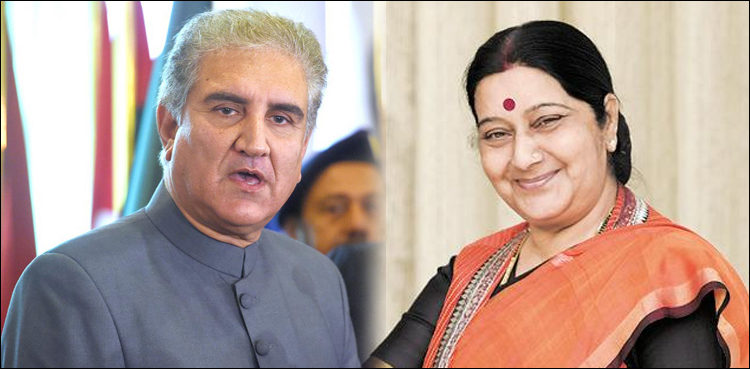Now that External Affairs Minister Sushma Swaraj will meet her Pakistani counterpart Shah Mehmood Qureshi on the sidelines of UN General Assembly in New York in the last week of this month, the moot question is what purpose the meeting will hold? Ministry of External Affairs spokesman Raveesh Kumar has already clarified that it would be just a “meeting” and not an opening of a “dialogue” between the leaders of the two countries.
The last foreign minister-level dialogue between the two countries was held in December 2015 when Sushma Swaraj flew to Islamabad to participate in the Heart of Asia meet over Afghanistan. However, peace talks between foreign secretaries of the two countries were suspended after Pakistan sponsored terrorists had carried out attack on the Pathankot Airbase in January 2016. More than two years later, India accepted Pakistan’s request for foreign ministers’ meet as Prime Minister Imran Khan, expressing desire for “peace” between the two countries, wrote a letter to his Indian counterpart Narendra Modi on September 14. The objective of the Pakistan Prime Minister’s letter is clear: First, he wants to end his country’s international isolation and second, he is keen to see that India doesn’t any more drum beat the terrorism issue across the world as it has almost denuded Pakistan of financial aids, investments and also meaningful trade and commerce with countries.
Is Mohan Bhagwat trying to be relevant in times of Modi and Shah?
China and Saudi Arabia are only two friends to stand in Pakistan’s support. Since 2016, not a single country even from the South Asian region has invited a Pakistani leader for a bilateral meet. Sri Lankan President Maithripala Sirisena, however, made an exception when he landed in Islamabad on March 22, 2018 on a three-day visit to the country. Nonetheless, it will figure only in diplomatic footnotes. Revival of SAARC can give Pakistan a major breathing space in the international field and it can’t happen unless India gives its consent. For this, Pakistan will have to agree to India’s position on cross border terrorism and end its open support to terrorist outfits like Lashkar-e-Taiba, Jaish-e-Mohammad and others.
But Imran Khan himself is facing a credibility problem; he is seen as a leader who got elected to the Prime Ministerial office due to Pakistan Army’s overt and covert support. He is not seen as a leader who can take an independent decision on foreign affairs front, especially India. Though in the past more than seventy years of its existence, Pakistan has been under direct military rule for more than three decades. Even during non-military rule, Pakistan has never witnessed any elected leader from Zulfikar Ali Bhutto to Nawaz Sharif taking independent views on the country’s relations with India. Those who dared to cross Army over and tried to defrost the two countries’ ties were either killed or removed from their chair unceremoniously. Imran Khan, who was elected to office after the July 25 General Elections, is aware of such ground reality. But he is caught between a rock and a hard place.
Pakistan General Election: An upright conduct or a rigged play?
In the face of deep economic crisis and mounting balance of payment problem in the country, the cricketer-turned-politician is left with a few choices. Without normalization of ties with India, he can’t save Pakistan from growing heat from the US and Europe on the terrorism issue, nor can he seek investments from abroad. China-Pakistan Economic Corridor project is the only major investment that Pakistan has today. But it too is looked with suspicion. After the December 2017 development in Sri Lanka where in Colombo had to handover Hambantota Port to China on a 99-year lease in exchange for debt, Pakistani nationals are worried about the prospect of $62 billion CPEC project and increasing Chinese debt on their country. They have started fearing that Pakistan may also go Sri Lanka’s way and will lose its sovereignty to China’s predatory designs. Though Imran Khan will temporarily manage to handle growing anti-CPEC sentiments in Pakistan, he will be able to deal with political storm that he may face from Nawaz Sharif and his family members as they have been released from jail now, has to be seen. Former Pakistan Prime Minister Sharif, his daughter Maryam and son-in-law Safdar Awan were imprisoned on corruption charges in July, shortly before the General Elections in Pakistan.
Hashtag Journalism: Comparative analysis between Republic and Times Now
Given that the Islamabad High Court has suspended sentences against Sharif and his family members on account of lack of proof, there is likelihood of the former Pakistan Prime Minister trying to resurrect his political position. In that situation, he may leave no stone unturned to make the life hell for Imran Khan who is running a coalition government. PML-N spokesperson and former information minister Marriyum Aurangzeb has already hinted that the former Pakistan Prime Minister will expose the Imran Khan-led government and launch a nationwide drive against rigging in the General Elections. As such Imran Khan’s letter diplomacy with India is seen in the context of his efforts to gain traction with New Delhi in securing peace on the western front and in ending international isolation. If he remains successful in his tryst, he will undoubtedly emerge as the strong Pakistan leader. But question is: Will Pakistan Army give him a free hand to deal with terrorism and to put the Jammu and Kashmir issue in the back burner in order to buy peace with India?
Disclaimer: The opinions expressed in this article are the personal opinions of the author.


















